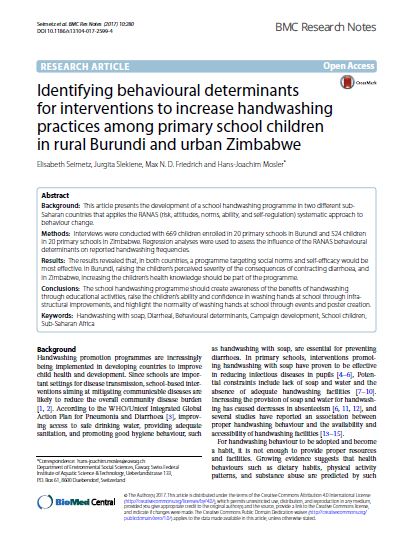Identifying behavioural determinants for interventions to increase handwashing practices among primary school children in rural Burundi and urban Zimbabwe
 |
article Jul 2017 ; 9 pages
Aut. Hans-Joachim Mosler & Max N. D. Friedrich & Elisabeth Seimetz & Jurgita Slekiene
Ed. BMC - London
Téléchargeable sous format: PdF
Téléchargeable chez l'éditeur
Page de présentation d'un éditeur
Abstract:
Background:
This article presents the development of a school handwashing programme in two different sub‑Saharan countries that applies the RANAS (risk, attitudes, norms, ability, and self‑regulation) systematic approach to behaviour change.
Methods:
Interviews were conducted with 669 children enrolled in 20 primary schools in Burundi and 524 children in 20 primary schools in Zimbabwe. Regression analyses were used to assess the influence of the RANAS behavioural determinants on reported handwashing frequencies.
Results:
The results revealed that, in both countries, a programme targeting social norms and self‑efficacy would be most effective. In Burundi, raising the children’s perceived severity of the consequences of contracting diarrhoea, and in Zimbabwe, increasing the children’s health knowledge should be part of the programme.
Conclusions:
The school handwashing programme should create awareness of the benefits of handwashing through educational activities, raise the children’s ability and confidence in washing hands at school through infrastructural improvements, and highlight the normality of washing hands at school through events and poster creation.
Mots clefs: |
école (CI) (DT) (OP) (ope) , lavage des mains, savon (CI) (DT) (OP) (ope) |
Pays concernés: |
Editeur/Diffuseur: |
|
BMC
-
BioMed Central - London - Royaume Uni |
En cas de lien brisé, nous le mentionner à communication@pseau.org